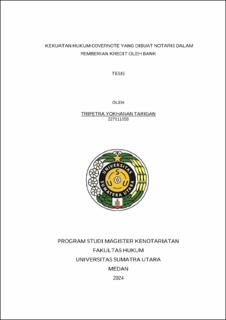| dc.description.abstract | The legal strength of cover notes made by notaries in the provision of bank credit is an important topic due to its vital role in banking and property transactions in Indonesia. Cover notes have become a common practice to expedite the disbursement of credit before all legal documents are fully processed, even though they are not considered authentic deeds. The status of cover notes raises serious questions about their legal force, as they are not explicitly regulated under the Notary Law. Cases of cover note misuse, which have led to significant losses for both banks and clients, highlight the urgent need to clarify the legal status and limitations of this instrument. The research aims to address three main issues: what are the functions and legal standing of cover notes in the credit granting process by banks, what is the notary's authority in issuing cover notes during credit disbursement, and what are the legal consequences of notarial cover notes in the bank credit process.
The research method used is empirical juridical, combining normative legal analysis with field research. A literature review was conducted to examine regulations and legal literature, while field research involved interviews with Notary Yetty Rosliana Sembiring, banking parties, and observations at notary offices. The data was analyzed qualitatively to understand the legal force of cover notes in bank credit practices.
In the bank credit process, cover notes serve as temporary guarantees and instruments to expedite credit disbursement, although they do not hold the same legal strength as notarial deeds. A notary's authority to issue cover notes is not explicitly regulated in the Notary Law (UUJN) but can be linked to the general authority of notaries under Articles 15 and 16 of the UUJN. The legal consequences of issuing inaccurate cover notes can be severe, including potential financial losses for banks, criminal and administrative sanctions for notaries, civil lawsuits, and broader impacts on public trust in the notarial profession and the banking system. This underscores the importance of integrity and caution among notaries when issuing cover notes, as well as the need for clearer regulations to govern this practice in order to protect the interests of all parties involved and to maintain the stability of the legal and banking systems. | en_US |


